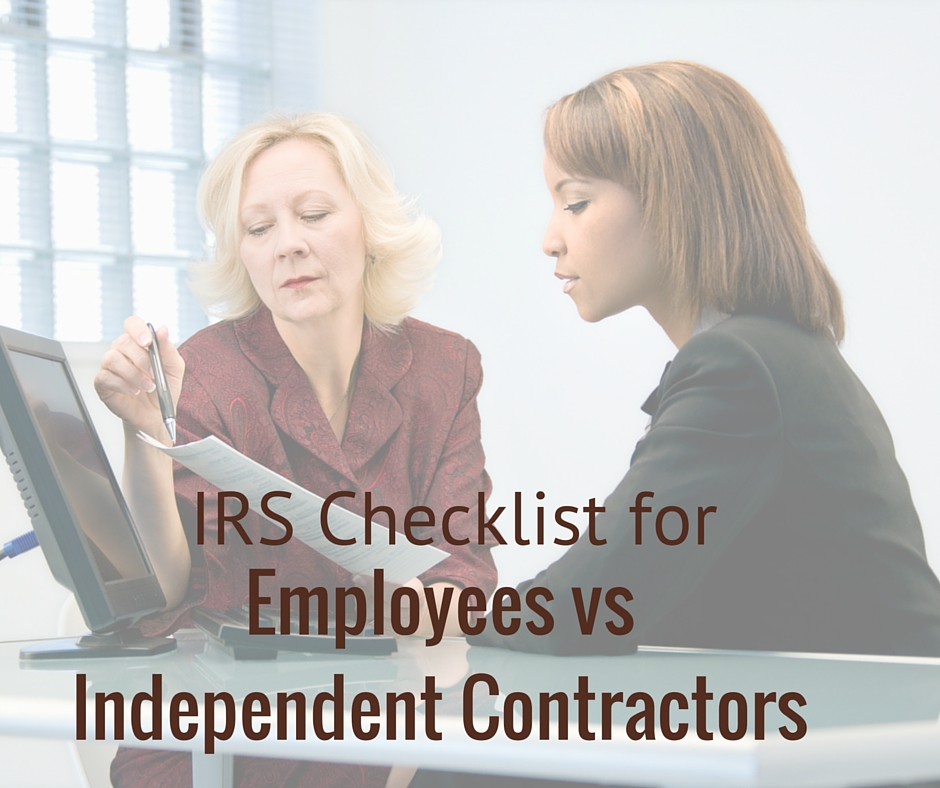Independent Contractor vs. Employee… a Checklist
It is extremely important that business owners correctly determine whether the individuals providing services are employees or independent contractors. According to California labor law, the basic test for determining whether a worker is an independent contractor versus an employee is whether the principal has the right to direct and control the manner and means by which the work is performed. If the employer is unclear whether the worker or the employer has the “right of control”, the employer should review and analyze a list of secondary factors that serve as evidence of the existence or nonexistence of the right of control.

The IRS has a checklist of 20 factors:
1. PROFIT OR LOSS Can the worker make a profit or suffer a loss as a result of the work aside from the money earned on the project?
2. INVESTMENT Does the worker have an investment in the equipment and facilities used to do the work? The greater the investment, the more likely independent contractor status will be found.
3. WORK FOR MORE THAN ONE CLIENT Does the worker perform services for more than one client at a time?
4. SERVICES OFFERED TO THE GENERAL PUBLIC Does the worker offer services to the general public?
5. INSTRUCTIONS Does the business have the right to give the worker instructions about when, where and how to
perform the services?
6. TRAINING Does the business train the worker to do the job in a particular manner?
7. INTEGRATION Are the worker’s services so important to the business that those services have become a necessary part of the business?
8. HIRING ASSISTANTS Does the business hire, supervise and pay the worker’s assistants or staff?
9. SERVICES RENDERED PERSONALLY Does the business require that the worker provide the services personally or may the services be delegated to someone else?
10. WORK HOURS Does the business set the work hours or is the worker the master of his/her own time?
11. CONTINUING RELATIONSHIP Is there an ongoing relationship between the worker and the business?
12. WORK PERFORMED ON PREMISES OF BUSINESS Must the worker perform the services on the premises of the business, or does the business control the route or location where the services are performed?
13. SEQUENCE OF SERVICES Does the business have the right to control and determine the order in which services are performed?
14. REPORTS REQUIRED Is the worker required to submit reports accounting for the worker’s actions?
15. PAY SCHEDULE Is the worker paid by the hours, day, week, or month as opposed to being paid by the job or on commission?
16. EXPENSES Is the worker reimbursed for expenses for business or travel costs?
17. TOOLS AND MATERIALS Is the worker provided by the business with the equipment, tools and/or materials necessary to perform the services?
18. EMPLOYER’S RIGHT TO TERMINATE May the business fire the worker at any time?
19. FULL TIME EMPLOYMENT Is the individual required to work full time for your company?
20. LIMITATION OF SERVICES Does the individual limit the availability of his services to the general public?
Businesses must weigh all these factors when determining whether a worker is an employee or independent contractor. Some factors may indicate that the worker is an employee, while other factors indicate that the worker is an independent contractor. The key is to look at the entire relationship, consider the degree or extent of the right to direct and control, and finally, to document each of the factors used in coming up with the determination. Once a business makes this determination, the business can ensure that federal and state laws are followed and avoid liability and risk through the implementation of proper workplace guidelines and practices.
In part two of this article, we will go over ways a business can help lessen the chance of miscommunication among its hires to ensure the proper classification.
About the author:
 Renie Leakakos, Esq., is the Managing Attorney for Leakakos Law, APC. She studied law at Loyola Law School. Renie has “traditional” attorney work experience in a law firm setting as an associate and managing partner. She also has extensive hands on experience working in the corporate arena in sales and marketing. Her expertise is in corporate formation and compliance, contract negotiation, investment due diligence, business transactions and real property law.
Renie Leakakos, Esq., is the Managing Attorney for Leakakos Law, APC. She studied law at Loyola Law School. Renie has “traditional” attorney work experience in a law firm setting as an associate and managing partner. She also has extensive hands on experience working in the corporate arena in sales and marketing. Her expertise is in corporate formation and compliance, contract negotiation, investment due diligence, business transactions and real property law.
You can learn more about Renie Leakakos in a previous Flight Club podcast episode.
Save





